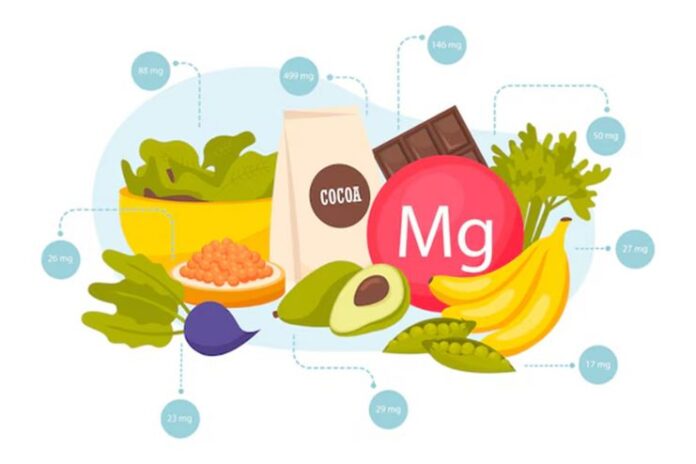AI Contribution
At HealthSpectra, we may use AI to refine grammar and structure, but every piece is shaped, checked, and approved by real people, our expert writers and editors, to ensure clarity, credibility, and care. Learn more..Affiliate Disclaimer
Some links in this article are affiliate links. We may earn a small commission if you make a purchase through these links, at no extra cost to you. We only recommend products we find useful to our readersMagnesium is a cofactor in more than 300 enzyme systems that regulate diverse biochemical reactions in the body. These include protein synthesis, muscle and nerve function, blood glucose control, and blood pressure regulation. Magnesium is an essential mineral, and its requirement cannot be ignored when discussing nutrition.
The symptoms of magnesium deficiency are often easily ignored. Not surprisingly, around 45% of Americans are magnesium deficient.
In this article, we review the symptoms of magnesium deficiency, foods high in magnesium, and how to increase your magnesium levels naturally. We also explore dietary changes to increase magnesium intake, the role of magnesium supplements, and other lifestyle changes that can help you overcome magnesium deficiency.
What Is Magnesium And Why Is It Important?

Magnesium is as important as any other mineral. It is the fourth most abundant mineral in the body, and our body needs magnesium to function properly. It plays a major role in several functions, from producing energy to helping build essential proteins.
Here’s a summary of how magnesium operates in different ways in the body:
- Muscle Function: Muscles primarily work through contractions and relaxations. When these processes are disrupted, muscle cramps can occur. Magnesium plays a crucial role in supporting proper muscle function, helping to prevent cramps by ensuring smooth and efficient movement.
- Bone Health: Around 60% of magnesium is stored in the bones. Apart from calcium, magnesium is another important component in managing bone health.
- Energy Production: Our bodies rely on food to generate energy, but for this process to be effective, the food must be converted into usable energy. Magnesium, along with proteins, plays a vital role in supporting this conversion, ensuring energy production runs smoothly.
- Mental Health: Maintaining mental health is essential in today’s fast-paced world. Magnesium supports a balanced mood and is known to help alleviate stress and anxiety, contributing to overall mental well-being.
- Sleep: Magnesium helps regulate neurotransmitters, which are critical for relaxation. By promoting a calm nervous system, magnesium supports better sleep quality and can assist in falling and staying asleep more easily.
Causes of Magnesium Deficiency
To address magnesium deficiency, it’s important to first understand its underlying causes. Here are some key factors that contribute to low magnesium levels:
- Poor Diet: Magnesium deficiency is often the result of poor dietary choices. Consuming a diet rich in processed, refined, and fatty foods, instead of magnesium-packed options, can lead to inadequate magnesium intake. Incorporating magnesium-rich foods like leafy greens and nuts into your diet can help address this deficiency.
- Medical Conditions: According to PubMed, certain conditions, such as diabetes, gastrointestinal disorders, and kidney disease, can cause magnesium depletion.
- Lifestyle Factors: Chronic stress, excessive alcohol consumption, and high caffeine intake make the magnesium levels in your body deplete faster.
- Medications: Magnesium levels can decrease due to certain medications, like diuretics and proton pump inhibitors.
Once you’re aware of these causes, you have taken the first step in addressing magnesium deficiency and its effects.
Symptoms of Magnesium Deficiency

Magnesium deficiency symptoms can be extremely subtle, making it challenging to identify a magnesium deficiency. Here are a few signs you must watch out for to detect a magnesium deficiency.
Physical Symptoms:
- Muscle Cramps: Magnesium promotes muscle relaxation, but low magnesium levels can lead to muscle cramps.
- Fatigue: Magnesium helps produce energy, its deficiency may lead to overtiredness and fatigue.
- Migraine Headaches: Studies suggest a correlation between low magnesium and migraines.
Mental Health Symptoms:
- Anxiety and Irritability: Feeling anxious or stressed out can be a sign of low magnesium levels in your body.
- Poor Concentration: Poor magnesium leads to a lack of focus and clarity.
Symptoms of Severe Deficiency :
- Heart Disorders: In extreme cases of deficiency, magnesium levels can affect the heart’s rhythm, potentially leading to arrhythmias.
- Osteoporosis: Having a magnesium deficiency for a more extended period and not addressing it at the right time can result in osteoporosis and risks of fractures.
We must detect these symptoms early to avoid severe complications.
How to Test for Magnesium Deficiency
A magnesium deficiency diagnosis requires blood tests. Blood tests can detect low magnesium levels, but they aren’t always reliable. Only 1% of magnesium is found in the blood, which is slightly unreliable, yet blood tests are prescribed to start the baseline assessment of deficiency.
A combination of symptoms needs to be studied for a correct diagnosis of magnesium deficiency. You may need medical history, urine samples, and tissue tests.
In case testing is not available, check for the following symptoms and other symptoms listed in the Symptoms section above to determine a potential deficiency:
- Constant fatigue that doesn’t go away
- Frequent muscle cramps or spasms
- Sleep imbalances
- Irritability, anxiety, mood swings
Consulting a healthcare provider for professional testing and diagnosis is always the best course of action.
Foods High in Magnesium

Including magnesium naturally in our diet is simple and gives immense benefits. Here are some easy-to-find magnesium-dense sources, as well as a few tips to include them effortlessly in your diet:
- Leafy Greens: Leafy greens, including spinach and kale, are great choices. You can eat them as a salad or make a smoothie.
Tip: Prepare smoothies using spinach and kale. - Nuts and Seeds: Nuts don’t just provide fiber and healthy fats, but also good amounts of magnesium. Add almonds, cashews, and pumpkin seeds to your diet for higher magnesium levels.
Tip: Have a mix of nuts ready for snacking when you feel hungry between meals. This mix can also add a perfect crunch to those boring salads. - Whole Grains: Brown rice, quinoa, and oats are excellent magnesium sources.
Tip: Replace your rice with quinoa. You can also have a bowl of overnight oats with the fruits of your choice, topped with nuts. - Legumes: Beans, lentils, and chickpeas are good plant-based sources of magnesium.
Tip: Pair your bread with hummus. Ensure you include either beans, lentils, or legumes in every meal. - Avocados: Avocados are an incredibly nutritious fruit and a tasty source of magnesium. One medium-sized avocado provides 58 mg of magnesium. They are also a great source of Vitamin K and B Vitamins and high amounts of monounsaturated fats. Include avocados in your diet to reduce inflammation, improve cholesterol levels, and increase satiety after meals.
Tip: Make avocado toast with sliced or mashed avocado and whole-grain bread. Or top a spinach salad with avocado chunks and a squeeze of lime juice. - Dark Chocolate: Dark chocolate is a perfect choice to boost your magnesium levels and have a healthy dessert. Opt for dark chocolate with at least 70% cocoa content to maximize magnesium content and low sugars.
Tip: Try a dark chocolate mousse, and top it off with nuts such as almonds or walnuts for added crunch and magnesium benefits.
Supplements: When and How to Consider It

Dietary changes are the primary way to boost magnesium levels, but adding magnesium-rich foods to your diet may not be sufficient. In such cases, after consulting with a healthcare professional, opt for supplements to improve magnesium levels.
How much supplement intake is ideal?
Before taking any supplements, it’s essential to know the Recommended Daily Allowance (RDA):
- Men (ages 19–30): 400 mg
- Men (ages 31+): 420 mg
- Women (ages 19–30): 310 mg
- Women (ages 31+): 320 mg
- Pregnant women: 350-400 mg, depending on age
Magnesium supplements have a recommended dose, which varies between 200 to 400 mg per day, depending on the brand.
The tolerable upper limit for taking magnesium supplements is 350 mg per day. In case of deficiency, you might need a higher dose, which can be only recommended by your healthcare Ensure that you do not over-supplement. This can cause side effects including diarrhea, and abdominal pain.
Which type of Magnesium supplement should you choose?
Magnesium supplements come in a variety of forms, some of which your body can absorb more easily than others. Below are a few of the types which are better absorbed:
- Magnesium citrate
- Magnesium lactate
- Magnesium aspartate
- Magnesium chloride
You can also choose from the delivery systems, which include pills, powders, liquids, or gummies. However, choosing either of these works well.
Lifestyle Changes to Boost Magnesium Levels
Adopting a healthy lifestyle can significantly enhance magnesium absorption and support overall nourishment. By making simple yet impactful changes, such as consuming a magnesium-rich diet, staying properly hydrated, and making mindful food choices, you can prevent or address magnesium deficiency. Research shows that pairing magnesium with vitamin D and calcium can improve its absorption, providing optimal health benefits.
Reducing alcohol and caffeine intake is also beneficial for magnesium absorption, as both substances can interfere with the body’s ability to retain magnesium. Consistent, positive lifestyle choices can have a lasting impact on your health. By prioritizing these small, manageable changes, you will experience greater benefits over time. Remember, a well-balanced diet combined with healthy habits can effectively prevent magnesium deficiency and improve your overall well-being.
Conclusion
Magnesium plays a crucial role in numerous bodily functions, yet magnesium deficiency is common and often overlooked due to its subtle symptoms. Issues like muscle cramps, fatigue, and anxiety are frequently dismissed as minor concerns, but it’s important to recognize the possibility of magnesium deficiency. To ensure your levels are adequate, it’s essential to have them checked and consult a healthcare professional.
The solution lies in incorporating magnesium-rich foods into your diet, taking supplements if necessary, and making positive lifestyle changes. Magnesium deficiency is preventable, and if diagnosed, it is treatable with the right interventions. Taking timely action can help restore balance and improve your overall health.
References
- https://ods.od.nih.gov/factsheets/Magnesium-HealthProfessional/#en1
- https://pmc.ncbi.nlm.nih.gov/articles/PMC6163803/
- https://pmc.ncbi.nlm.nih.gov/articles/PMC1855626/
- https://www.webmd.com/vitamins-and-supplements/vitamins-minerals-how-much-should-you-take
- https://pmc.ncbi.nlm.nih.gov/articles/PMC9598104/
- https://www.healthline.com/nutrition/magnesium-dosage
- https://www.healthline.com/nutrition/10-foods-high-in-magnesium
In this Article






















